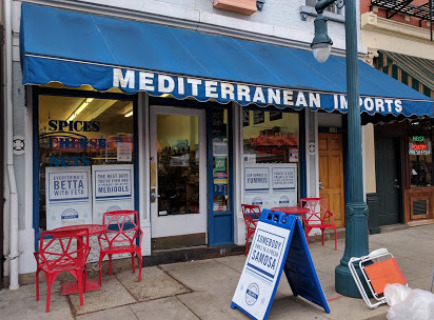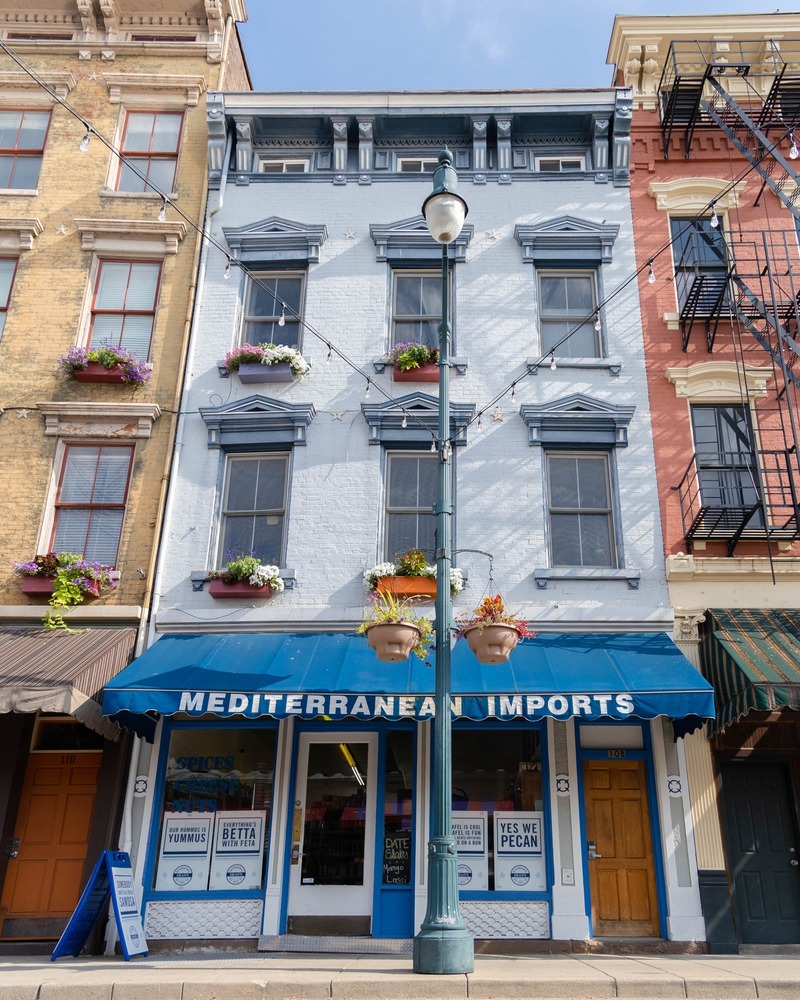
Early Years of 44 Elder - The Diehl Family
Built in 1866, 108 W. Elder—initially numbered 44 Elder—was constructed as a three-and-a-half-story building with a rear one-story extension. The first floor was always commercial and was first home to Henry Paulsen’s boots and shoe store in 1866.
Henry was born in Bavaria in 1832; he lived at 44 Elder with his wife Caroline, a German immigrant from Hanover. They had previously used the storefront at 46 Elder (110 W. Elder) in 1865 before moving over to 44 Elder. From 1867 to 1869, Fred Hart then used the commercial storefront for his shoes business.
From 1870 to 1889, Nicholas Diehl (1849-1932) and Jacob Haas (1828-1902) teamed up for Haas & Diehl, their commission produce company. From the building’s construction until the turn of the 20th century, Nicholas’ extended family lived at 44 Elder, along with other families.
Henry was born in Bavaria in 1832; he lived at 44 Elder with his wife Caroline, a German immigrant from Hanover. They had previously used the storefront at 46 Elder (110 W. Elder) in 1865 before moving over to 44 Elder. From 1867 to 1869, Fred Hart then used the commercial storefront for his shoe business.
Fred was a German immigrant born in 1840. He and his wife Rachel raised their children, Amelia, Rosa and Henry, in Over-the-Rhine at Findlay Market. In 1870, he moved his business and family to 38 Elder (what is now the middle storefront in Noli) where he operated from the first floor until the 1890s. He and his family lived upstairs with around four other German immigrant families.
From 1870 to 1889, Nicholas Diehl (1849-1932) and Jacob Haas (1828-1902) teamed up for Haas & Diehl, their commission produce company. From the building’s construction until the turn of the 20th century, Nicholas’ extended family lived at 44 Elder, along with other families. The following year, in 1890, George N. Reis and Benjamin H. Otting briefly partnered for another produce operation. Soon, though, Nicholas Diehl replaced George Reis and joined Ben Otting for Otting & Diehl—which lasted through the turn of the 20th century at 44 Elder (soon renumbered to 108 W. Elder).
Benjamin (also listed as Bernard) Otting was born in 1861 to John Otting, a German immigrant from Bavaria, and his wife Catharine. He married into the Diehl family when he wed Amelia (Diehl) (1865-1936) who was the daughter of John H. Diehl (1836-1905).
Then, from the turn of the 20th century until 1907, Otting & Diehl continued, although it was then run by Benjamin’s widow Amelia and her brother Adolph R. Diehl (1875-1949) (so, Nicholas Diehl’s nephew).
Amelia owned the building at this point. Adolph was married to Jessa (Tressler) (1880-1973). Despite helping to manage the family business with his sister, Adolph was actually a physician. His time in medical school in the late 1890s was interrupted by the Spanish-American War—which he served in as a 2nd Lieutenant in the Ohio Volunteer Infantry. He later worked for the IRS and during the 1920s became a federal Prohibition agent. Ironically, after Prohibition ended, he worked as a salesman for a distillery.
108 W. Elder in the New Century
From 1907 to 1915, Frank Straukamp & Sons was the next business to sell produce out of 108 W. Elder. Frank (1866-1923) was born in Ohio in 1866 to Frank and Elizabeth Straukamp who were both from Prussia. He and his wife Lizzie (Summe) had nine children but only five survived childhood, including Adelaide, Veronica, Alphonso, Joseph and Marie. Frank initially worked as a stove molder and mounter like his father, but he then embarked on a produce business at 108 W. Elder.
For this venture, he leased the storefront from Amelia Otting who still owned the building; his monthly rent was $40. From 1917 to 1920, Charles P. Mende—of Mende, Grote & Company, a fruit business located down on the river at 112 E. Front—used 108 W. Elder for his other produce operation, Farm Products Company.
Then, from 1922 until 1931, 108 W. Elder transitioned to a candy shop under Louisa Krueger (1870-1933). She also had a confectionary at 3648 Warsaw in Price Hill. She was familiar with Findlay Market as well, as she had previously worked from 124 W. Elder. During these years, until 1948, Emil Helfesrieder (1870-1930) and then his wife Bertha (Albiez) (1871-1948) owned the building. Emil was a German immigrant, born in 1870, who came to the U.S. from Gonnin, Baden, as a teenager in 1887. He and his wife—who married in 1901—had a daughter, Frieda, and a son, Alfred, whom Emil supported by being a butcher.
The family did not live at 108 W. Elder despite their ownership. Emil was a Spanish-American War veteran, earning the rank of corporal. In 1929, a year before his death, his wife filed for a pension for them, citing that her husband was unable to work due to a physical disability. He passed away the following year, and then Bertha owned 108 W. Elder until her death in 1948. Louisa (Liesner) Krueger, the confectioner, was born in 1870 in Germany. She wed William B. Krueger (1880-1920) on August 5, 1889. They had two children, Charles (1894-1947) and Wilbur (1902-1945).
Sometime in these years, the rear one-story portion of 108 W. Elder was demolished (or just added onto), and the front brick three-and-a-half-story portion was extended back (to the north) to take up the full plot of land. After Louisa’s candy store, John R. Thomas sold poultry from 108 W. Elder until 1935. He was followed by John Kirsch’s (1895-1954) restaurant which lasted from 1936 until the mid-1950s. From 1950 to 1955, John owned the building. John was born in 1895 in Grad (in what was then Hungary) to John Kirsch and Elizabeth (Schnatz).
He immigrated in 1910 and worked in his younger years as a machinist. Married to Betty (Dreyer) (1904-1994), he was the father to Joseph John (1924-1951) and Betty Mae (Young) (1925-2000) whom he raised with his wife in Over-the-Rhine on Race and later Pleasant Street. Joseph assisted his father with the café. Joseph was also a World War II Navy veteran—who sadly died very young.
In the fall of 1951, at only twenty-seven years of age, he was found dead in his garage at his home in Norwood in what was either an accident or suicide.
“Mr. Kirsch was found Saturday night lying at the rear of his auto in the tightly-closed garage,” the Cincinnati Post reported. “The ignition of his auto was turned on and the motor was still warm. Police said the engine probably stalled when oxygen in the air became exhausted. Four cigarette butts found nearby had apparently been smoked by Mr. Kirsch after he entered the garage. A chemical analysis was ordered by Coroner Lyle. His wife, Mrs. Betty Jo Kirsch, could give no reason for suicide. She said her husband had been shopping in Findlay Market during the evening. He failed to blow the horn as usual when he entered the garage. When she later noticed the doors closed, she investigated and found the body … He also leaves two children, Joseph Jr., 6, and Connie, 3.”
John Kirsch passed away in 1954.
Pete’s Bar then occupied the storefront. It was run by Pietro Montemerlo (1898-1987). Pietro was born in Italy in 1898. He immigrated through New York City in 1933 and then moved to Cincinnati. In 1944, he attempted to gain naturalization but was denied for “failing to show good moral character,” according to Immigration and Naturalization Services. He and his first wife Louise, who was a restaurant proprietor, divorced in 1952; the Domestic Relations Court granted the divorce to Louise on grounds of “neglect” by Pietro. He later remarried.
He and his second wife Leona (1921-2008) lived in northern Kentucky for much of their lives. They are buried in Floral Hills Memorial Gardens in Taylor Mill. Lobby Bar was the next commercial venture at 108 W. Elder, lasting from the 1960s until the early 1980s. It was briefly shut down in 1974 for unsanitary conditions (at the time, it had forty violations against it for unhygienic equipment and unclean basement and kitchen spaces).
Dean’s Mediterranean Imports moved into 108 W. Elder in 1985 and has been there since then. It was started by Dean Zaidan from Beirut, Lebanon. In the 1970s, in the midst of the burgeoning Lebanese Civil War, eighteen-year-old Dean fled to Oman where he worked briefly in the dietary department of a hospital. He met his wife Cheryl, a Peace Corp volunteer, there. They moved to Detroit where Dean worked for his uncle’s nuts business.
They then moved to Cincinnati where Cheryl had grown up. Here, Dean started his own business—Dean’s Nuts—at Findlay Market and raised his daughters Kate, Ann and Nadia. The nuts business soon morphed into Mediterranean Imports. Dean’s daughter Kate now manages the store.
Images

